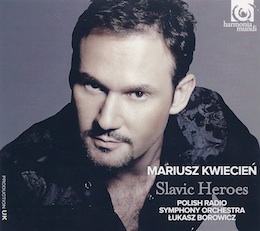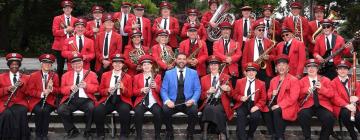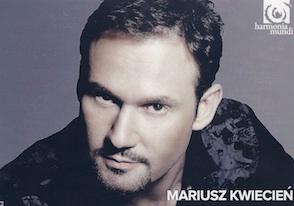
Are all the great baritone roles in Slavic opera about loving, suffering for, and losing women? That’s what it began to feel like when — starting with the first of the 13 arias on Polish-born Mariusz Kwiecień’s new disc of Slavic Heroes — Eugene Onegin (by Tchaikovsky), Robert in Iolanta (also Tchaikovsky), Aleko (Rachmaninov), Vok in The Devil’s Wall (Smetana), Janusz in Halka (Moniuszko), and Mazeppa (again Tchaikovsky) successively sang themselves out over love.
Even when the Prince’s thoughts in The Cunning Peasant (Dvořák) were freed from one woman in particular and instead expressed through the lovely metaphor of nature abloom with the hope of happiness, and when the Swordbearer, Miecznik, in The Haunted Manor (Moniuszko) proclaimed that he would give his daughter’s hand only to a man of valor who was a crack shot, etc., romantic love was the motivator. It wasn’t until the ninth aria on this CD, when the Venetian guest in Sadko (Rimsky-Korsakov) sang the praises of Venice, that composers and baritone took one step away from Venus.
Listen To The Music
Tchaikovsky Iolanta Robert's aria, aka Who can compare with my MatthildeSzymanowski Król Roger (King Roger) Final scene, hymn to Apollo


Why my growing sense of tedium with all these ultraromantic outpourings to love lost, won, or for the winning? After all, don’t most arias and plots in the Italian tradition concern themselves, to one extent or the other, with the exact same thing? Why is this collection of baritone arias far more trying than others that concern themselves with the same issues?
As I soldiered on through the last four tracks, finding real relief only in the ear-opening, quasi-mystical soundscape of King Roger’s final scene hymn to Apollo (Szymanowski), I began to realize that, as earnestly and beautifully as Kwiecień sang, his voice was not touching me. Which voices touch us, I realize, is a very personal matter. But it would be dishonest to review Slavic Heroes using the usual critical language, which at least implies the application of objective criteria, without acknowledging how subjective feelings are clouding objective judgment.
I recall the two times I’ve heard Kwiecień perform live. He was ideally typecast as the Don in San Francisco Opera’s Don Giovanni in June 2007 — a handsome, trim, athletic man with an equally handsome voice who twirled a woman on his shoulders while jumping from one table to another as easily as his character had twirled thousands of women around his little finger. But I thought him positively overbearing in his insistently high-volume Dichterliebe recital in Hertz Hall.
At that lieder concert, I bemoaned the fact that Kwiecień seemed so preoccupied with proving that he could dominate both repertoire and hall that he never pulled back enough to let his heart speak unfettered. And that, ultimately, is what I feel about this CD recital. Kwiecień has an extremely fine voice, and sings with great attention to diction and legato. He is a superb, committed, frequently passionate vocalist who has made a deserved name for himself in the world’s major houses. But every note he sings seems to proclaim “man, man, man.” I know he must have a vulnerable side, but I can’t feel it through all the posturing. You, of course, may feel differently.

